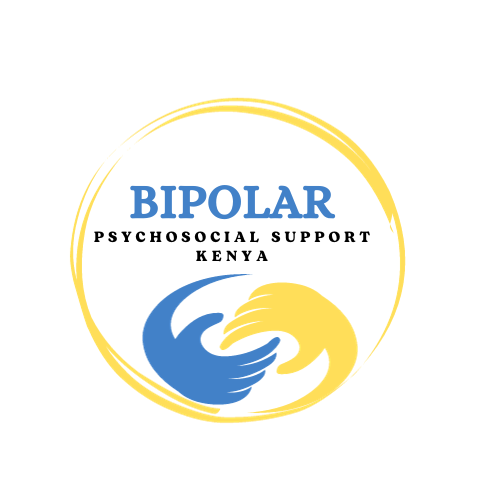FAQ
FAQ
What exactly is Bipolar?
Bipolar disorder is a mental health condition characterized by extreme mood swings, including emotional highs (mania or hypomania) and lows (depression); it is a significant health concern globally, including in Africa.
They are three known types of Bipolar:
This is characterized by manic episodes lasting at least seven days (or almost every day for the majority of the day) or by manic symptoms severe enough to require emergency medical attention. Depressive episodes usually happen too, and they usually continue for at least two weeks. It is also possible to experience mixed-feature episodes of depression, which include both manic and depressed symptoms concurrently. “Rapid cycling” is the term used to describe having four or more manic or depressive episodes in a single year.
This is characterized by a pattern of hypomanic and depressive episodes. In bipolar I, the hypomanic episodes are milder than the manic episodes.
(Known as cyclothymic) is characterized by recurrent periods of hypomanic and depressive episodes that are neither severe enough nor prolonged enough to be classified as such.
FAQ’s on Bipolar
Below is a breakdown of frequently asked questions about Bipolar:
Bipolar affects moods. It is a mental illness marked by pronounced and unusual swings in mood, energy, level of activity and concentration.
- Bipolar prevents people from working.
- Bipolar affects only adults.
- Bipolar affects all individuals equally.
- Mania helps bipolar individuals become more productive.
- Substance abuse is the cause of bipolar disorder.
- Only medication can treat bipolar disorder.
- Bipolar is a personality defect or character trait.
- You can heal from Bipolar condition
- Medication alleviates all symptoms of Bipolar
- People with Bipolar cannot have self-control or regulate their emotions
- People with Bipolar are attention seekers
- Bipolar is all in the mind, a figment of imagination
- People with Bipolar cannot maintain a relationship
- People with Bipolar are violent
- Therapy cannot help manage bipolar.
Bipolar disorder is characterized by significant mood fluctuations. These can vary from significant highs (mania) to extreme lows (depression). Manic and depressive episodes might last several days or more. To confirm that you have bipolar disorder, you should get a diagnosis from a psychiatrist. Certain criteria are incorporated with guidance from the Diagnostic Statistical Manual of Mental Disorders (DSM), which is carried out by a psychiatrist or mental health nurse. The symptoms also vary according to the person exhibiting them.
Here are some of the symptoms as indicated in https://www.nhs.uk/mental-health/conditions/bipolar-disorder/symptoms/
Depression
During a period of depression, your symptoms may include:
- Feeling sad, hopeless or irritable most of the time
- Lacking energy
- Difficulty concentrating and remembering things
- Loss of interest in everyday activities
- Feelings of emptiness or worthlessness
- Feelings of guilt and despair
- Feeling pessimistic about everything
- Self-doubt
- Being delusional, having hallucinations and disturbed or illogical thinking
- Lack of appetite
- Difficulty sleeping
- Waking up early
- Suicidal thoughts
Mania
The manic phase of bipolar disorder may include:
Making decisions or saying things that are out of character and that others see as being risky or harmful
Feeling very happy, elated or overjoyed
Talking very quickly
Feeling full of energy
Feeling self-important
Feeling full of great new ideas and having important plans
Being easily distracted
Being easily irritated or agitated
Being delusional, having hallucinations and disturbed or illogical thinking
Not feeling like sleeping
Doing things that often have disastrous consequences – such as spending large sums of Money on expensive and sometimes unaffordable items
These are the possible causes of bipolar:
a. Childhood Trauma (Neglect, Sexual, physical or emotional abuse, Traumatic events, Losing someone very close to you, such as a parent or caregiver).
b. Stressful life experiences. (PTSD Stressful life/trauma, abuse, loss and grief).
c. Brain Chemistry/Neurochemistry. This shows that bipolar disorder could be linked to neurotransmitter abnormalities. While some evidence confirms this, no one knows exactly how these neurotransmitters function. And it is not entirely known whether these problems are a cause or a result of bipolar.
d. Family links/genetics.
e. Environment/Background.
Yes, Bipolar can be treated using holistic techniques that meet their psychological requirements, such as therapy. While including psychiatric treatment via medication, if necessary, and physical activities/practices that can help enhance mental health. Having a spiritual foundation can also help an individual have some hope to grasp on to during times of extreme lows or depression.
Nutrition is also an important element of managing bipolar; some foods may affect hormone synthesis, which may influence certain mood fluctuations, and it is critical to consider how the meals one consumes influences their mental health.
Bipolar symptoms are made worse by stressful conditions that induce severe mood swings. However, when a person with bipolar is in a secure setting and is included, as well as given the necessary accommodations to help them function at their full potential, symptoms are infrequent. This does not imply that the symptoms are fully gone; the individual may still have mood swings, but their intensity will be lessened once in a suitable environment. If you have a loved one who has bipolar, it is important to educate yourself about how the illness impacts the individual, how to manage mood swings, and practices that can make the individual more comfortable and less frustrated in their circumstances.
Anger is not a symptom of bipolar illness. Some persons with bipolar perceive frustration as anger, which can escalate to rage. However, this emotion is triggered by painful or emotional experiences that the individual with bipolar may be sensitive to, and it does not always occur.
Yes! Bipolar Psychosocial Support of Kenya (BPSK) is an organization that provides safe and inclusive environments for people with bipolar disorder and their loved ones. We offer psychosocial help, peer support, and empowerment programs for persons with bipolar disorder, their caregivers, and loved ones.
